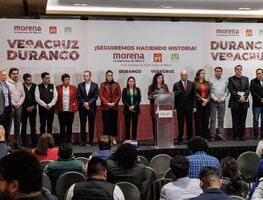Más Información

Inai alerta sobre intentos de limitar acceso a la información; comisionados locales denuncian coacción

Morena, PT y Verde van juntos en elecciones en Durango y Veracruz; evitarán perfiles con vínculos al crimen organizado

Comité de Evaluación del Poder Legislativo emite lista complementaria a elección judicial; hay 105 candidatos a la SCJN

Convocatorias 2025 para programas del Bienestar; Beca Rita Cetina, Mujeres del Bienestar y Salud Casa por Casa

Monreal califica reunión con Sheinbaum y Adán Augusto como un llamado “oportuno”; “hay retos y riesgos”, señala
Some evil spell had settled on the community; mysterious maladies swept the flocks of chickens,
and the cattle and sheep sickened and died.
Everywhere was the shadow of death.”
Silent Spring by Rachel Carson
In her landmark book, Rachel Carson described the process of biomagnification , in which toxic chemicals concentrate in animals at higher levels up the food chain. Silent Spring helped launch the modern environmental movement and drew global attention to the dangers of DDT and other pesticides .
DDT
and its sub-products disperse through air and water, and their effects are felt far beyond the places where they are used. Due to their high levels of toxicity , DDT and other similar chemicals were banned by industrialized nations in the 1970s but continued to be used widely in developing countries. The problem, however, is not just pesticides .
According to the Ocean Health Index , some 100,000 chemicals are regularly used today, the most dangerous being: agricultural fertilizers , nitrous oxides (from agricultural soils and livestock manure, fossil fuel combustion, and industrial processes), and toxic heavy metals such as lead (used in gasoline, rechargeable batteries, toys), chromium (main component of stainless still), and mercury (from coal-burning power plants, gold and cement production). We have turned our rivers , lakes , and oceans into latrines where those pollutants end up, joined by residential and industrial wastewaters .
The effects of pollutants on human health and the costs to national and global economies are colossal. The Lancet Commission on Pollution and Health estimated that 9 million people died prematurely in 2015 as a result of pollution-related diseases . It is a global serial killer , responsible for 16% of all deaths: three times that of AIDS , tuberculosis , and malaria combined, and 15 times that from all wars and other forms of violence. A staggering 92% of deaths are in low-and-mid-income countries, causing losses in productivity that each year reduce their GDP by as much as 2%.
Still, pollution and its effects are not priorities on the global health agenda , nor for international cooperation. Governments’ egos are better served by squandering mammoth amounts of money on military defense: in 2018 the United States spent USD$ 825 billion on weapons , and China spent USD$148 billion in 2017, according to the Stockholm International Peace Research Institute .
The scale of wastewater discharge and litter from cruise ships is staggering. A moderately-sized ship transports some 3,500 passengers who, according to the World Wide Fund for Nature , weekly generate 795,000 liters of wastewater , 3.8 million liters of gray water , 500 liters of hazardous waste , 95,000 liters of oleaginous bilge water , and 8 metric tons of trash . The Caribbean Tourism Organization estimates that cruises in the Caribbean—a principal global market—hosted 29 million tourists in 2015 , indicating a measure of the problem. Remember these numbers the next time you think about booking a cruise.
Straws were made of cardboard when I was young; admittedly, I have no idea whether the paper was recycled or came from unsustainable logging. In any case, paraphrasing Bill Clinton´s 1992 campaign slogan: “ It's the plastic, stupid! ” Roland Geyer and his colleagues from the University of California at Santa Barbara estimated that over the last 170 years we produced 8.3 billion metric tons of plastic , most of which ended in sanitary landfills or polluting continents and the oceans. According to a report from the Ellen MacArthur Foundation , 8 million tons of plastics are thrown into the seas every year and today there are 150 million tons in the world´s oceans. Greenpeace has declared “ war ” on plastic .
Reducing and remediating environmental damages requires financial resources far beyond the fines currently imposed by authorities on polluters. In the worst environmental disaster in Mexico's mining industry , in 2014 , the Buena Vista del Cobre mine (the world´s seventh largest copper mine) of Grupo México poured 40,000 cubic meters of acidulated copper sulfate into the Bacanuchi and Sonora rivers near the city of Hermosillo in Sonora . The fine was ludicrous— MXN$ 23.5 million (some USD$ 1.3 million )—even though the environment department ruled the mining company should have paid compensation for environmental damages estimated at hundreds of millions or even billions of pesos.
Things might be changing though. In August , a judge in the United States ordered Monsanto (producer of the glyphosate-based herbicide Roundup ) and its owner, the German company Bayer , to pay USD$ 289 million in damages to Dewayne Johnson , a 46-year-old former groundskeeper, who has terminal cancer. Although last Monday the amount to be paid was reduced to USD$ 78 million . Monsanto was ruled liable for Mr. Johnson’s cancer and for failing to warn him of the health hazards from exposure to Roundup. Thousands of similar cases are said to be potentially facing Monsanto just in the U.S., which could seriously threaten the company´s future. We shall see what happens in the other 129 countries where Roundup is used on more than 100 crops. Will they follow the suit?
Fifty-six years ago, this fall, Silent Spring met fierce criticism. Attacks and efforts to discredit Dr. Carson came, as expected, from powerful chemical companies such as DuPont . Some tried to portray her negatively as a sentimentalist “ in love with nature .” Rachel Carson was both a hard scientist and a naturalist . There doesn’t need to be an opposition between the two. The root source of scientific inquiry may well be an unapologetic love for nature. A passion we better heed if we were to live in a healthier natural world.






